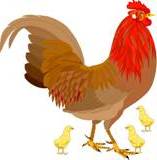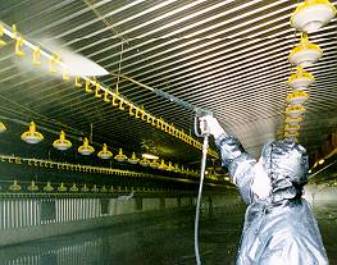 |

|
11/09/05 |
          
|
Clean OutAfter every flock depletion the farmer has to remove all the litter and prepare the building for the next flock and it is important that all the poultry buildings are cleaned down at the same time to keep any disease risk to a minimum. The litter has a high nitrogen value and is used on the land as fertilizer. Some farmers recycle their litter to power stations where it goes to make electricity. More information can be found at www.fibrowatt.com The litter is often removed by skid steer loader. These very agile machines can get into corners and around posts quickly. . Wash down & sanitization
Hygiene is of the utmost importance to the farmer when he prepares the rearing house for the new chicks. Much time and care goes into preparing a chicken house. If the cleaning process is not done properly, then the new flock is exposed to a higher disease risk. After the removal of all the litter, the outside of the building is washed, then all the equipment inside must be thoroughly cleaned. Modern poultry buildings have all the internal equipment suspended from the roof, as you can see in this photograph and it is lowered to the ground after the bedding has been laid. The ability to wash the equipment "in place", saves much time in the cleaning stage. All the large production units in the UK are sanitized like hospitals. Where large numbers of birds are reared, it is necessary to sanitize as much as possible, to protect the new chicks against diseases to which they have no inbuilt immunity. The floors and walls are not only covered with disinfectants, but also insect inhibitors. The eradication of all insect and especially beetle eggs is very important to stop the carry over of diseases. After that fogging machines fill the air with a disinfectant mist ensuring a through coverage of all the nooks and crannies. Before the bedding can be laid, the floors must be allowed to dry out. In winter or in short turn round periods it is difficult to dry the floors in time for the fresh bedding and hot air has to be introduced to speed up the drying out process. Finally, after all the pre-flock preparation is complete, the air is fogged again with disinfectants. Fact:- In September 1981 a British farmer was paid 23.5p.p.lb (51.8p per Kilo) for his chicken. In February 2005 that same farmer is paid 22p.p.lb (49p per Kilo). |
This site was last updated 10/17/05
